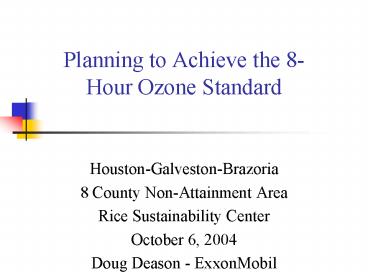Planning to Achieve the 8-Hour Ozone Standard - PowerPoint PPT Presentation
Title:
Planning to Achieve the 8-Hour Ozone Standard
Description:
April 15, 2004 EPA designated & classified HGA as 8-hour nonattainment; effective June 15, 2004 ... Houston area set in April , 2004 EPA Rule. 93 ... in Extreme ... – PowerPoint PPT presentation
Number of Views:27
Avg rating:3.0/5.0
Title: Planning to Achieve the 8-Hour Ozone Standard
1
Planning to Achieve the 8-Hour Ozone Standard
- Houston-Galveston-Brazoria
- 8 County Non-Attainment Area
- Rice Sustainability Center
- October 6, 2004
- Doug Deason - ExxonMobil
2
8-Hour Ozone Discussion Items
- Issue Background
- HGAs Classification Timing
- Ozone Source Mix
- Planning Cycle
- Questions Answers
3
EPA 8-Hour Ozone Standard
- EPA performed mandatory 5-year review in 1997
- 8-hour standard is more stringent than the 1-hour
- April 15, 2004 EPA designated classified HGA as
8-hour nonattainment effective June 15, 2004 - Same 8-County area as before
- State must submit 8-hour SIPs June 15, 2007
- Attainment Deadline for Houston June 15, 2010
- Classification - Moderate (granted 6 years after
designation to meet the standard - clock begins
June 15, 2004) - Controls must be in place before the ozone season
of 2009 - Only four areas of the country given deadlines
beyond 2010 - All in California
4
8-Hour Implementation IssuesAttainment
Classifications and Deadlines
- 8-Hour attainment classifications set by
monitored 8-hour ozone design value - Classification table provides statutory number of
years allowed for attainment - 2010 Compliance Deadline for Houston area set in
April , 2004 EPA Rule
Houston-Galveston-Brazoria (0.102 ppm)
93 of the 8-Hour Subpart 2 non-attainment countie
s (243) fall into these first two classifications
2007
2010
15 CA counties are serious
2013
No counties are in Severe-15
2019
4 CA counties are Severe-17
2021
No counties are in Extreme
2024
5
(No Transcript)
6
2007 Controlled NOx Emissions About Equally
Balanced Among Industrial , On-Road, and Off-Road
Sunlight
- Little or no wind
- High temperatures
- Clear skies
OXYGEN
Ground Level Ozone (O3) Formation
Volatile Organic Compounds (VOC)
Nitrogen Oxides (NOx)
Sources Houston Regional Monitoring
and Business Coalition for Clean Air
7
Keys to Success
- Continued advancement in technology cost
effectiveness across all source types - Acceleration of Federal program benefits
(Fuels/Engines, Transport and Regional Haze
rules) to 2009, or - Significant new local controls that are
available, technically feasible and
cost-effective by 2Q09 - Continued need for TERP-2 funding post 2007
8
8-Hour Ozone - 1 Hour Measures Set the Stage
- Many 8-hour ozone exceedances are driven by
1-hour exceedances - 1-hour Measures effectively will work both
- Some 8-hour ozone exceedances occur with NO
1-hour ozone exceedance - 1-hour ozone measures reducing continuous
emissions will reduce 8-hour ozone - Some 8-hour exceedances may be due to transport
9
Summary Statistics of One and Eight-Hour
Exceedances
10
Summary Statistics of One and Eight-Hour
Exceedances
11
Summary Statistics of One and Eight-Hour
Exceedances
12
8-Hour Ozone Schedule
EPA Designates Areas 4/15/04
Attainment Deadline for Houston gt95 of
non-attainment areas nation-wide
TEXAQS II
TX Submits Adopted State Implementation Plan
(by 6/2007)
EPA Finalizes Phase 1 Rule (04/15/ 04)
Attainment Deadlines for Remaining 19 Counties
Nation-wide
Develop SIP Modeling Control Strategies
2007
2004
2005-2006
2010
2013-24
13
Outlook for 2005 2006
- 1-hour SIP Measures (NOx Reductions , HRVOC
Monitoring, and new HRVOC Emission Limits)
continue to implement - TEXAQS 2000 Study data analysis continues
- New Science data (TCEQ, TERC, and TARC)
generation and analysis continues - Houston modeling improvements continue
- TEXAQS-2 Field work and data analysis informs
8-hour ozone SIP































